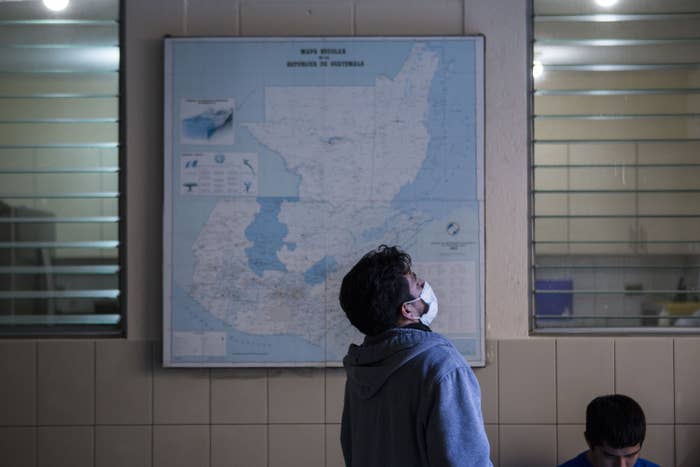
The American Civil Liberties Union and other organizations filed a lawsuit in federal court on Wednesday challenging a controversial Trump administration policy to send asylum-seekers from El Salvador and Honduras to Guatemala.
The ACLU, together with the National Immigrant Justice Center, the Center for Gender & Refugee Studies, and Human Rights First, claims the policy violates federal law by not allowing asylum-seekers access to legally mandated protections and by potentially sending them to areas where they may be persecuted. The group is asking a federal judge to block a Trump administration rule that allows officials to set up procedures for the "safe third country" policy and subsequent guidance given to asylum officers.
“Because of the Rule, vulnerable asylum seekers are shut out of the United States and left to seek protection in countries with barely functioning asylum systems that cannot adequately protect them,” the group wrote. “And if the receiving country rejects an individual’s claim, that individual likely cannot get another chance at asylum in the United States. The result is a deadly game of musical chairs that leaves many desperate asylum seekers without a safe haven, in violation of U.S. and international law.”
While we cannot comment on litigation, the U.S. Government and the Government of Guatemala remain committed to the asylum cooperative agreement and stand behind the integrity of the program," Heather Swift, a spokesperson for the Department of Homeland Security, said.
The Trump administration has said deporting asylum-seekers to Guatemala is a key element in its strategy to deter migration at the border and restrict asylum-seekers from entering the US. Advocates and asylum officers have told BuzzFeed News that the plan lacks legality and organization and will lead to immigrants being placed in dangerous circumstances.
DHS officials signed the third-country agreements to send US-bound asylum-seekers to Guatemala, Honduras, and El Salvador. Thus far, only the agreement with Guatemala has been implemented.
Those thrust into the program by border officials must be interviewed by asylum officers to determine if they are eligible to be deported to Guatemala. The immigrants are told they will be deported to Guatemala and can obtain protections there, instead of in the US. Before that interview, immigrants have no access to legal counsel — unlike their initial asylum screening when they first arrive at the US border.
The asylum-seeker must explicitly state that they fear persecution or torture in Guatemala in order to have an opportunity to avoid deportation, according to emailed guidance sent to asylum officers, which is also being challenged by the ACLU. The asylum-seekers must prove it is “more likely than not” that they will be persecuted or tortured in Guatemala.

However, the ACLU claims this process lacks the necessary protections for asylum-seekers.
“The Rule’s bare bones procedures ... are woefully inadequate to ensure that those who risk persecution, torture, or death in receiving countries will not be erroneously removed to danger there,” the lawsuit states.
The administration has so far only deported those from El Salvador and Honduras, but had been planning to send Mexican asylum-seekers there as well before that portion of the policy was put on hold.
The group said the rule and the guidance from US Citizenship and Immigration Services “cast aside our asylum laws, which reflect Congress’s carefully considered balance between effectuating our broad, historic commitment to protecting refugees fleeing persecution and torture—a commitment with origins in the 1951 United Nations Convention Relating to the Status of Refugees—and ensuring fairness and efficiency in the asylum process.”
The lawsuit was filed on behalf of several asylum-seekers who were sent to Guatemala as part of the policy. In one case, a gay asylum-seeker from El Salvador identified as U.T. tried to explain to US immigration officials that he did not want to be deported to Guatemala, because the country, he said, was not safe for queer people.
“U.T. decided to apply for asylum in Guatemala, but because that country is also unsafe for gay people, Guatemalan officials advised him to go to Mexico, where they said he could apply for asylum,” the civil rights groups wrote. “U.T. is in Mexico for now, but he remains uncertain how or where to find safety.”
A “resource guide” on Guatemala was given to asylum officers as part of materials to implement a controversial policy to deport adult asylum-seekers from El Salvador and Honduras to Guatemala.
The guide, which was obtained by BuzzFeed News, relies primarily on public sources: academic publications, research from Human Rights Watch and other organizations, and news reports. The materials include information on pervasive violence against women in the country, killings of indigenous activists, the prevalence of the notorious gang MS-13, and a link to a research paper that states “a culture of violence and impunity pervades all of Guatemalan society today.”
